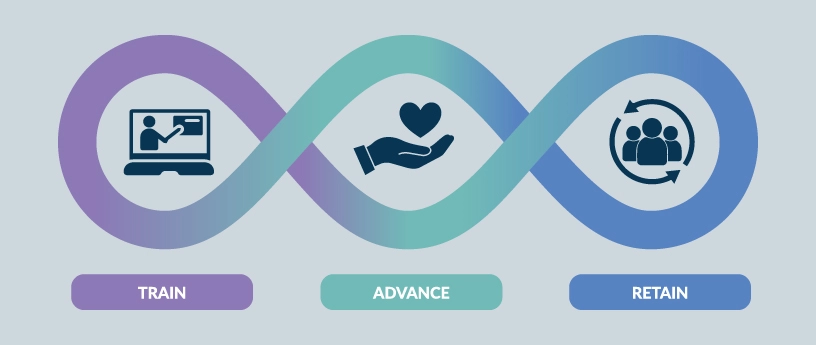Want a Strong Healthcare Team? Medical Assistants Play a Key Role

While the actions of a single healthcare professional can advance an office or practice, groups of professionals that work well together are capable of creating a synergistic effect that extends far and wide. Effective teamwork can improve an organization’s performance and increase revenue, at the same time positively impacting employee engagement and productivity.1 Not to mention, cohesive healthcare teams are critical for patient safety, primarily through enhancing communication and care coordination.2

Team members in various roles can contribute to the betterment of healthcare groups, organizations, and even the patients they serve. That said, in many of today’s facilities, medical assistants play an extra special part in promoting the teams they work with, and they do this in several different ways.
How Medical Assistants Elevate Healthcare Teams Today
The medical assistant (MA) role is continuously evolving, with researchers from the Stanford University School of Medicine calling this category of healthcare workers “foundational to team-based care.”4 What is it that makes MAs such important players in elevating modern healthcare teams?
#1: Increased Clinical Efficiency
Medical assistants are trained to perform a variety of clinical tasks, from measuring patients’ vital signs to drawing blood for testing to providing care instructions after an in-office surgical procedure. Performing these duties contributes to an efficient, streamlined patient service process. It also keeps physicians and nurses from having to handle these tasks, allowing them to focus on providing complex patient care while also preventing their workload from increasing to the point where it leads to feelings of burnout.

#2: Reduced Administrative Burden
Medical assistants can perform administrative duties related to scheduling, recordkeeping, and billing. Taking care of these tasks helps reduce the burden on other healthcare team members, giving them more time to engage in critical functions within their job roles they may typically struggle to find time to complete. For example, updating patient records frees more time for physicians to spend with patients.

#3: Improved Patient Experience
Several factors contribute to how patients feel about their healthcare experience, including the information they are provided and the communication they receive.7 Medical assistants can play an active part in each, thereby helping organizations improve patient satisfaction levels. This can boost the retention of both patients and staff, also reducing medical malpractice risk.8

Medical Assistants Impact Patient Care
MAs are also valuable in terms of patient care. A 2021 study found that when medical assistants screened patients for depression, screenings increased from 18% to 57%, particularly in populations facing disparities.10 In addition, a 2024 study reported that when MAs provided health coach support, patients with type 2 diabetes had significantly improved clinical outcomes.11
Determining ROI: Translating MA Contributions into Revenue and Growth
If nurses and physicians are performing tasks within a medical assistant’s purview, they may be struggling to keep up with other job duties. One solution is to increase the number of nurses and physicians on staff; however, since these are higher-wage positions, this can elevate labor expenses.

A lower-cost solution is to increase MA staff to handle the clinical and administrative tasks for which they’re trained, reducing the workload of professionals in higher-paid positions. This may lessen the need to hire more higher-earning staff. It might also contribute to increased revenues by giving physicians time to see more patients daily, increasing practice billings – while not jeopardizing quality care.
Healthcare organizations can realize an indirect return on investment from team efficiency increases since process improvements and enhanced collaboration contribute to greater financial sustainability.13 Improved patient satisfaction contributes to an organization’s financial success as well by fostering the development of long-term relationships with patients who —based on their level of satisfaction — may be more likely to refer family and friends.
Importance of Medical Assistant Training
Effectively integrating MAs into a healthcare team requires that they be adequately trained. Training programs provide new medical assistants with the knowledge and skills needed to perform typical job functions. Continued learning via upskilling programs enable experienced MAs to brush up on their skills and stay up to date on the latest healthcare advancements and technology.
What if medical assistants are reluctant to train for changes in their job roles? Research suggests this isn’t the case.14 That makes this a good time to invest in medical assistant training, giving these healthcare professionals the ability to contribute to better team performance and improved patient outcomes.
Invest in Your Medical Assistants, Invest in Your Team
A healthcare team is only as strong as its members. By investing in your medical assistants —who can help increase clinical efficiency, reduce administrative burdens on other team members, and improve patient outcomes and care — you’re also investing in your team. And Nasium Training is here to help.

We offer a 25-week Medical Assistant training series that includes online didactic learning and in-person clinical instruction. Learners are also prepared to sit for the Certified Clinical Medical Assistant (CCMA) certification exam administered by the National Healthcareer Association (exam fee is included). For employees who’ve completed MA training but don’t have their certification, Nasium Training also offer a 2-week CCMA exam prep course.
Contact us today and let’s talk about how we can help you train your medical assistant staff, preparing them to not only excel in their roles but also to be valuable members of your entire healthcare team.
1 Johnson SS, Grossman R, et al. Knowing Well, Being Well: Well-Being Born of Understanding: The Science of Teamwork. Am J Health Promot. https://journals.sagepub.com/doi/full/10.1177/08901171211007955
2 Haugstetter M, Hines S, et al. Revising TeamSTEPPS. AHRQ: Patient Safety Network. https://psnet.ahrq.gov/perspective/revising-teamstepps-evolution-patient-safety-teamwork-training
3 Stoller JK. Building Teams in Health Care. CHEST. https://www.sciencedirect.com/science/article/abs/pii/S001236922034513X
4 Rokicki-Parashar J, Phadke A, et al. Transforming Interprofessional Roles During Virtual Care. J Prim Care Commun Health. https://www.ncbi.nlm.nih.gov/pmc/articles/PMC8366115/
5 U.S. Surgeon General. Addressing Health Worker Burnout. https://www.hhs.gov/sites/default/files/health-worker-wellbeing-advisory.pdf
6 Herd P, Moynihan D. Health Care Administrative Burdens. Health Serv Res. https://www.ncbi.nlm.nih.gov/pmc/articles/PMC8522557/
7 Ferreira DC, Vieira I, et al. Patient Satisfaction with Healthcare Services and the Techniques Used for its Assessment. Healthcare. https://www.mdpi.com/2227-9032/11/5/639
8 Agency for Healthcare Research and Quality. Why Improve Patient Experience? https://www.ahrq.gov/cahps/quality-improvement/improvement-guide/2-why-improve/index.html
9 Blackman M. The Link Between Financial Success and Patient Satisfaction. Medical Economics. https://www.medicaleconomics.com/view/the-link-between-financial-success-and-patient-satisfaction
10 Gorman DC, Ham SA, et al. Medical Assistant Protocol Improves Disparities in Depression Screening Rates. Am J Prevent Med. https://www.sciencedirect.com/science/article/abs/pii/S0749379721003226
11 Fortmann AL, Soriano EC, et al. Medical Assistant Health Coaching for Type 2 Diabetes in Primary Care. Diabetes Care. https://diabetesjournals.org/care/article/47/7/1171/154594
12 HFMA. Health Systems Near Their Breaking Point. https://www.hfma.org/press-releases/health-systems-near-their-breaking-point-labor-costs-continue-to-increase-while-dollars-collected-from-payers-decreases/
13 Ong MV, Vigonte F. Enhancing Financial Performance. SSRN. https://papers.ssrn.com/sol3/papers.cfm?abstract_id=4862408
14 Fraher EP, Cummings A, Neutze D. The Evolving Role of Medical Assistants in Primary Care Practice. Med Care Res Rev. /https://pubmed.ncbi.nlm.nih.gov/33074038
